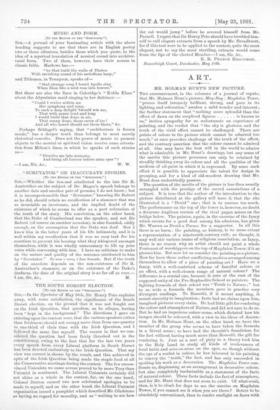MUSIC AND FORM.
[To THE ZDITOR Of THE " SPECTATOR."] SIR,—A perusal of your fascinating article with the above heading suggests to me that there are in English poetry two or three allusions, besides those which you quote, to the idea of a mystical translation of musical sound into architec- tural form. Two of them, however, have their source in classic fable. Marlowe has :— " he that built the walls of Thebes With ravishing sound of his melodious harp ;" and Tithonus, in Tennyson, speaks of- " that strange song I heard Apollo sing When Ilion like a mist rose into towers."
But there are also the lines in Coleridge's " Kubla Khan" about the Abyssinian maid singing to her dulcimer :— "Could I revive within me
Her symphony and song, To such a deep delight 'twould win me, That with music loud and long I would build that dome in air, That sunny dome, those caves of ice And all who heard should see them there," &c.
Perhaps Schlegel's saying, that " architecture is frozen music," has a deeper truth than belongs to most merely rhetorical conceits. Does not the power of music to present objects to the mental or spiritual vision receive some attesta- tion from Milton's lines, in which he speaks of such strains as—
"Dissolve me into ecstasies, And bring all heaven before mine eyes "P


































 Previous page
Previous page